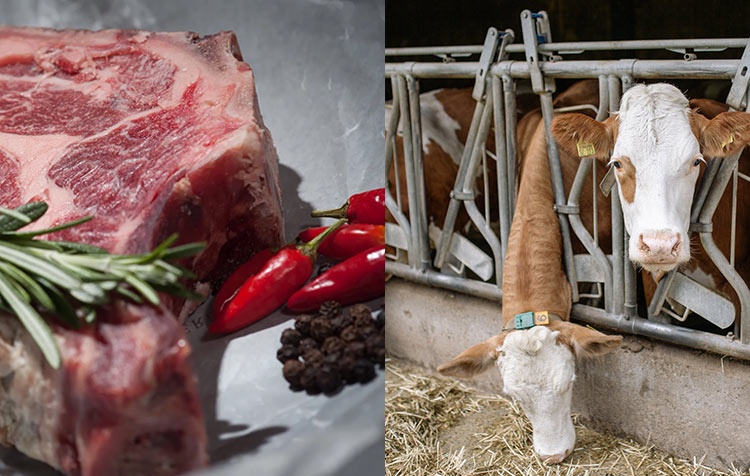Want to learn more about euphemism in animal products, such as meat, eggs, milk or honey? Then you've come to the right place! Euphemisms are euphemistic, mitigating paraphrases for unpleasant objects or circumstances. Veiling terms with which the meat, egg, dairy industry and co. create the greatest possible psychological distance to the animal for whose agony and death we ultimately pay money "voluntarily and gladly".
This is in reality a deliberate manipulation and consumer deception that soothes our conscience while acting against our own values (e.g., love, mercy, compassion).
In this article, I would like to introduce you to some euphemistic words and technical terms that are intended to distract us consumers from the suffering caused by animal foods. In addition, I will briefly explain what they actually are. Let's go!
In advance, here is an overview for you:
- Meat
- Processing plant
- Ham
- Leather
- Milk
- Honey
- Sausage
- Bacon
- Artificial insemination
- Dairy cow
- Animal production
- Slaughter
- Human
- Fresh meat
- Schnitzel
- Bycatch
- Ready for slaughter
- Poultry
- Refinement
- Animal Welfare
- Cropping
- Fur
- Adjusted inventories
- Free-range
- Inventory clearing
- Salami
- Species appropriate husbandry
- Goulash
- Wool
- Euthanasia
- Caviar
- Sailor
- Bündnerfleisch
- Kotlett
- Suction extractor
- Intensive animal husbandry
- Farrowing pen
- Livestock
- Eggs
- Broiler
Notice: Not all terms are euphemisms in the classical sense - but all of them definitely have a euphemistic effect.
1. meat
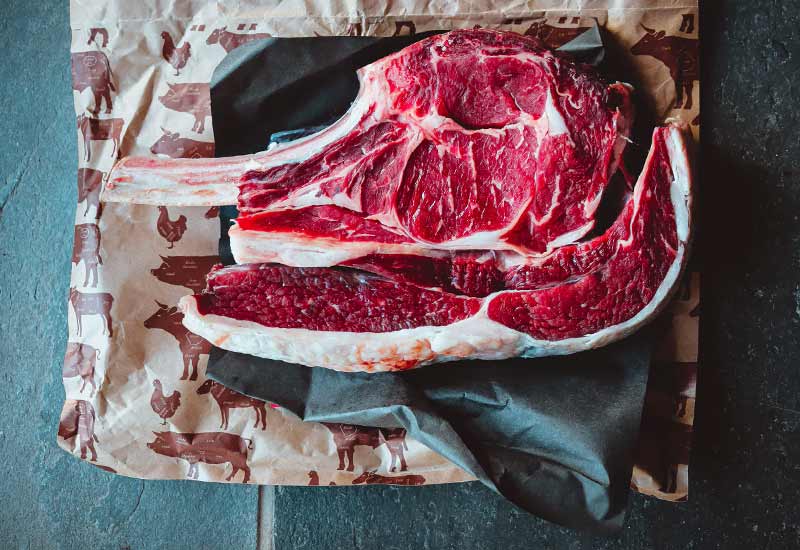
... instead of body part.
Actually, it is body parts of pigs, cattle and sheep. The term "meat" softens reality and sits so deeply in our vocabulary that we no longer even question it.
2. processing plant
... instead of slaughterhouse.
A processing plant can really be anything, and yet in our minds it is more reminiscent of a factory where items are assembled or manufactured - rather than killed and disassembled. So the real circumstances are obscured by this euphemism, making consumers feel better.
3. ham
... instead of part of the hind leg.
Whether it's cooked ham or air-dried and smoked ham, there's little about these expressions that reminds us of what was once alive, sentient animal.
4. leather
... instead of chemically preserved animal skin.
Leather is another euphemism for animal products. Genuine leather is nothing more than chemically treated, tanned animal skin.
5. milk
... instead of breast milk.
One of the euphemistic terms is the word "milk". It sounds much better than still drinking mother's milk in adulthood. But in the end it is nothing more than the secretion of the mammary glands of female, domesticated animals.
Tip: Why vegans do not drink milk and which plant-based alternatives for cow's milk I will explain in more detail in the linked articles.
6. honey
... instead of sugary excreta products of insects.
Bees produce honey as their own source of nutrition. It is produced when the insects swallow nectar and honeydew and these substances enter their so-called honey bladder. The bee then regurgitates the plant sap again and again and sucks it up again. More appropriate than the pleasant-sounding term "honey" would therefore be the word "bee vomit".
7. sausage
... instead of intestines stuffed chopped body parts.
Certain words make animals delicious - and obscure the cruel background for meat eaters. The word "sausage" is definitely one of them and increases the distance to the origin of the "food", which actually only consists of chopped up and mixed together body parts of animals.
8. bacon
... instead of sliced fat tissue from the pork.
Also, the euphemism "bacon" makes the consumption of animal products much more pleasant, because it does not remind of the animal bred and killed for consumption. But in reality it is only fatty tissue, which is under the skin of pigs.
9. artificial insemination
... instead of sexual rape.
In humans, the term stands for voluntary insemination that grants the hope of a child of one's own. In animal husbandry, however, it is a euphemism for the process of forcibly and involuntarily inseminating a female animal - and thus for sexual rape of animals, which happens purposefully, regularly and completely legally so that we humans can drink the mother's milk.
10. milk cow
... instead of cow.
This euphemism simply rests on how the animal benefits man and suggests that the cow exists only for the one purpose.
11. animal production
... instead of systematic exploitation and killing of animals.
The partial term of production suggests that it is about products and not about sentient living beings. Products are lifeless, which is why this euphemism in animal husbandry makes it easier to ignore the suffering and murder of animals for one's own consumption.
One more thing: "Meat production" is also a euphemism and is representative of the systematic and mass killing of animals to produce meat products.
12. slaughter
... instead of killing or assassination.
The meat industry tries spasmodically to avoid terms like "killing" because it naturally goes against the values we were all brought up to believe in. Even "slaughtering" is actually still too extreme, which is why people prefer to resort to euphemisms like "culling," "euthanizing," or "production process." This soothes one's own conscience - and somewhat curbs the reflexive inclination to become a vegetarian or vegan that is actually to be expected.
13. human
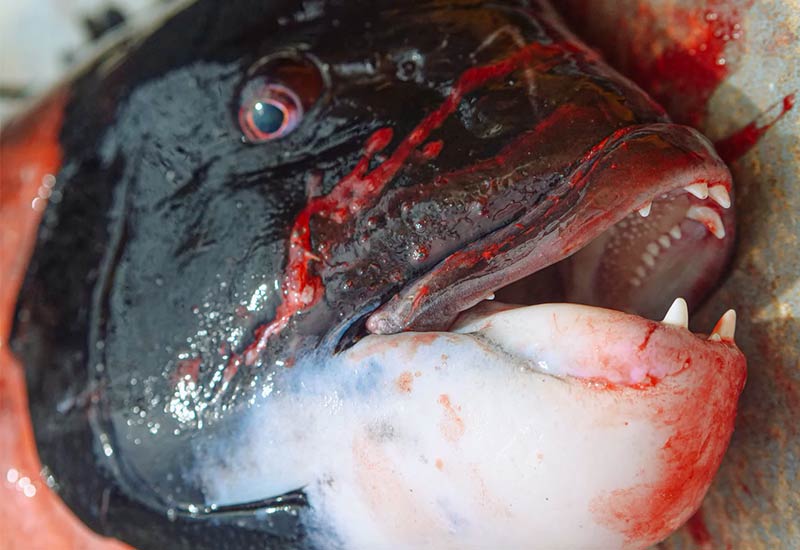
... instead of brutal.
Normally, there is no need to mention whether something is humane (that is, humane, merciful, without harshness and with forbearance). Nevertheless, the animal industry speaks for safety's sake of the "Humane Battles"when she speaks of the killing of the "farm animals" in the gas chamber, in the electric bath or by throat cutting.
14. fresh meat
... instead of non-preserved body parts of dead animals.
Fresh food is nutritious and delicious. However, fresh meat is the muscle tissue of recently killed animals. And fresh fish is actually the exact opposite, a rotten body part from a fish - which is why it smells accordingly.
15. cutlet
... flattened, pressed muscle fibers from the hind leg or back of animals.
The term schnitzel is also a euphemism used with animal products to mitigate the unpleasant sensation of eating body parts of a sentient creature.
16. bycatch
... instead of unintentionally trapped, suffering and killed animals.
In the fishing industry, sharks, dolphins, sea turtles, whales, seals or birds, for example, usually end up in the nets, although other animals should actually be caught. These animals, which often die in the nets, are euphemistically dismissed as bycatch, implying that it is okay to kill animals for human consumption.
17. slaughter maturity
... instead of fat enough to be killed.
"Maturity for slaughter" is a fairly economical term in the most efficient meat industry possible, which is a euphemism for saying that a cow, pig, or other "farm animal" is large and heavy enough to be killed and broken down into many parts. The word part "maturity" puts the animal on a level with plants and makes the killing seem like a natural state.
18. poultry
... instead of chicken.
Poultry are species of birds that are bred as livestock or pets - such as the chicken. The word generalizes and also increases the distance to the individual.
19. refinement
... instead of controlled spoilage of further processed, animal breast milk.
Those responsible in the animal industry like to talk about refining their products when it comes to their further processing. This sounds much healthier, tastier and of higher quality - but it does not make the process more efficient. Refining loss, for example, refers to the 25 kilograms of grain that are roughly required to produce one kilogram of beef.₁
20. animal welfare
... instead of minimally less animal suffering.
Another euphemism for animal husbandry is the term "animal welfare. A corresponding label and the words "welfare" and "animal" are supposed to give us a better conscience - but basically nothing changes for the animal itself. In reality, there can be no talk of animal welfare if it is kept in captivity, exploited and killed - at most "a little less". cruelty to animals„.
21. docking
... instead of amputating body parts.
For example, to prevent stressed pigs and chickens from injuring themselves in factory farming, their curly tails, teeth and beaks are shortened.
22. fur
... hairy coat of an animal.
At Fur most of us understand a piece of clothing, rather than the body part of an animal. The term creates a safe distance from the thought its former, animal owner and takes the psychological, moral hurdle to buy corresponding products.
Tip: How you Recognize real fur and how to bypass it in a targeted manner, you will learn in a separate article.
23. adjusted inventories
... instead of targeted killing of animals intended by humans.
Especially among hunters, people like to talk about "adapted populations" or "taking from nature" when they specifically hunt and kill certain species.
24. free range
... instead of keeping animals not exclusively indoors.
The word parts "free" and "country" suggest that chickens are doing well and that "free-range eggs" can be consumed with a clear conscience. But free-range chickens are also overbred, have to share one square meter with nine conspecifics and are killed in the same slaughterhouse as caged chickens.₂
25. inventory clearance
... instead of killing a whole herd due to external influences.
If a disease breaks out in a barn, all the animals may be killed at the same time - by gassing, for example. However, the term depopulation is more reminiscent of a retail sale.
26. salami
... instead of raw dried pork with mold coating.
A salami is simply dried muscle tissue from animals. Another euphemism that draws a big veil around the background of the production of meat products.
27. species-appropriate husbandry
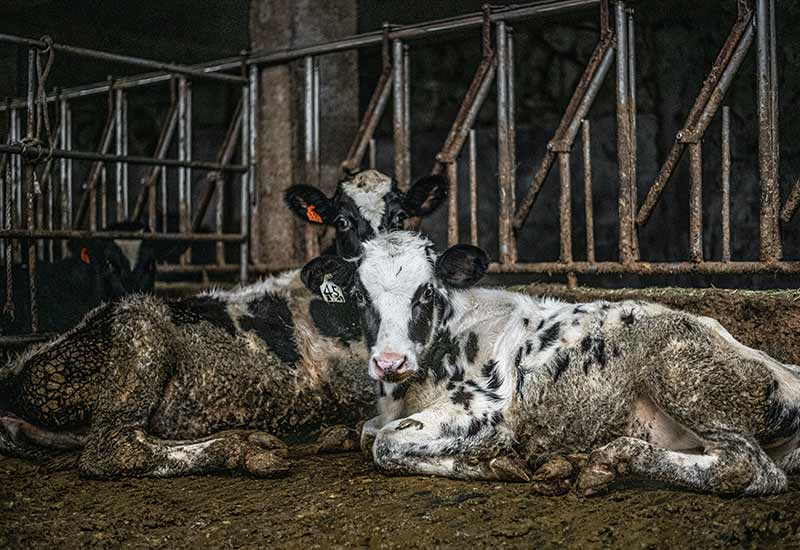
... instead of captive (and bred) animals.
Keeping cows, pigs or chickens in a few square meters with thousands of other animals is not appropriate for the species. If you reduce the number to 150 animals, it is also not species-appropriate. The animals were bred only for human purposes and are kept captive - this cannot be argerecht.
28. goulash
... instead of cadaver muscle cubes.
Beef goulash is nothing more than cubed pieces of meat from older, killed animals. However, the term "goulash" makes it easier to continue paying for the torture and killing of animals.
29. wool
... instead of soft hairs of the fur of sheep.
Wool sounds much cuddlier and more harmless than (often violently) severed animal hair, don't you think? Another euphemism that downgrades animals from an independent individual with feelings to an insensitive production good.
30. euthanasia
... instead of beating weak, sick animals against a wall.
By euthanasia we actually understand the peaceful death of a suffering living being in its own interest. Instead, however, euthanasia in factory farming is aimed at the economic interest of the farmer, who beats weak, injured or sick animals against the wall until they are dead. Unfortunately, this is a common practice.
31. caviar
... instead of mature eggs of female fish and other marine animals.
Actually, it is roe from various sturgeons. But "roe" is also a euphemism for fish eggs - and nothing else is meant by caviar: cleaned and salted fish eggs.
32. sailor
... instead of animal insufficiently stunned during killing and dismemberment.
Extremely cynical is the euphemism "sailor" commonly used in the slaughter industry to describe, for example, pigs and chickens that wake up in the scalding bath while their body parts are torn off while they are still alive.
33. Bündnerfleisch
... instead of dried cadaver muscle.
Bündnerfleisch is considered a culinary specialty from Switzerland. It is cured meat from the thigh muscles of cattle, freed from tendons and fat.
34. cotlett
... instead of cadaver bone with cadaver muscle.
Slices made from the ribs of pigs, calves, or lambs, complete with bones, have also found a euphemistic alternative term in "feces," which masks and hides violence against animals.
35. suction extractor
To the usual Tools in factory farming counts the so-called suckling weaners. This is a spiky nose ring designed to stop little calves from drinking their mothers' milk, as this is to be bought and drunk by humans.
36. intensive animal husbandry
... instead of factory farming.
Also the concept of Factory farming now has a very bad image. Accordingly, the euphemism "intensive animal husbandry" or "modern animal husbandry" is often used. This at least sounds as if the welfare of the animals is important to one and the most modern technologies are used.
Tip: What you can do personally against factory farmingyou can read in the linked article.
37. farrowing pen
... instead of tight metal brackets used to secure pregnant sows.
In the first weeks after birth, sows suckle their piglets. In factory farming, this happens in what are called "farrowing pens." A euphemism that describes the environment in which the mother sows are basically immobilized under metal restraints.
38. livestock
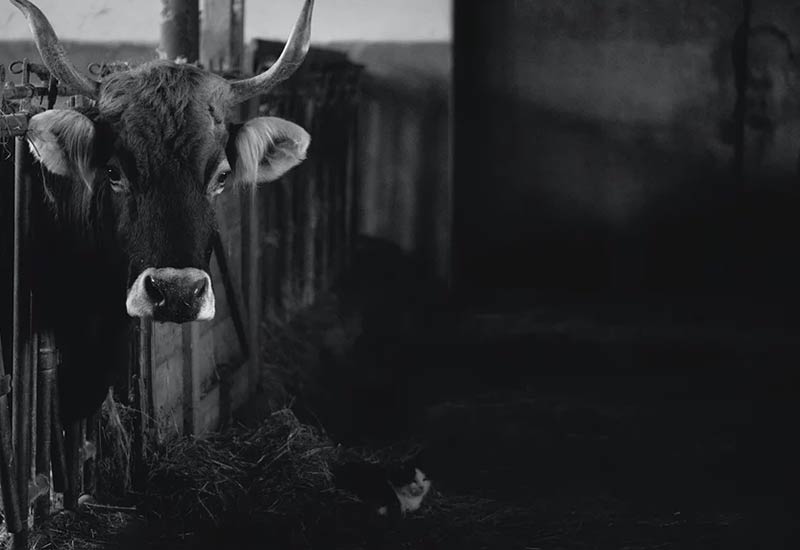
... instead of cow, pig or chicken.
This euphemism of animal husbandry also gives the impression that human benefit is part of the essence of animals. In this way, a differentiation is created between wild animals/pets (which must be protected) and farm animals (which may be killed) - although morally there is no difference.
Good to know: Such a judgmental distinction between different breeds of animals is called a Speciesism. It is ultimately also based on the benefit of the individual to the individual.
39. eggs
... instead of menstrual product of a chicken.
An egg must pass through the ovary, fallopian tube and vagina of a hen before it is laid by the chicken. The word egg may not be a classic euphemism, however, it glosses over what it actually is: the hen's period. For many Vegan is in any case the decisive reason to give up eggs.
Tip: Vegetable egg alternatives you will learn in the linked article.
40. broiler
... instead of fried chicken.
Broiler is the name given to fried chicken. And since this is also a euphemism of the meat industry, it is more precisely a fattened and fried chicken.
Know euphemism in animal products and face reality
Changing habits is hard - but who really wants to live in harmony with his own values, as well as inner conflicts and remorse (more under cognitive dissonance) should not regard animals as objects but as sentient individuals who, like us, feel pleasure and pain and have daughters, sons and parents.
An animal lying in the street we call a carcass - an animal on a plate we call dinner. Try to see mitigating, obfuscating, euphemizing and sometimes trivializing terms for what they really are. The key takeaway here, live vegan, in my opinion, is that you no longer have to sugarcoat anything, because you are finally acting fully in line with your own values.
Finally I would like to give you the Dominion film which is guaranteed to open your eyes to the suffering of animals for our consumption habits.
Do you have any questions, tips or other euphemisms that the industry uses to disguise the background of the production of meat, eggs, milk or cheese? Then I look forward to your comment.
Be always kind to animals,

PS.: In our language there are also some Sayings with animal involvementwhich are not animal-friendly at all. In the corresponding article I show you some examples.
References:
₁ Things Explained - In Brief: Meat - The World's Tastiest Evil, YouTube, Jan. 24, 2019, web, May 07, 2020 at 10:50 a.m., in: http://y2u.be/y6f3dwxexZM.
₂ Lisa Mainz; PETA Deutschland e.V.: 4 reasons why free-range eggs cause suffering (as of 15.03.2022), available at https://www.peta.de/themen/freilandhaltung-huehner-eier. [07.04.2022].

